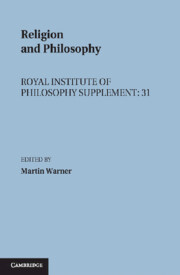Introduction
Published online by Cambridge University Press: 04 August 2010
Summary
Religion, Reason and Reality
‘Religion’ is standardly defined either as ‘a particular system of faith and worship’ or as ‘recognition on the part of man of some higher unseen power as having control of his destiny, and as being entitled to obedience, reverence, and worship’ (OED 1971: II 2481). The focus, that is, may be on religion either as a practice or as a framework of ideas and beliefs, but the two elements are interdependent; faith and worship are unintelligible without some idea of that to which they are directed, and religion's characteristic conceptions are such that certain practices and responses are seen as appropriate—even mandatory. Indeed, it has often been argued that ‘religion’ derives from religare (‘to bind’), witnessing through its very etymology to the characteristic religious sense of binding obligation, a duty of ‘obedience, reverence and worship’, as well as of social bonding. The contemporary notion of religion as a matter of free human choice is of comparatively recent development, strongly influenced by secular pressures; more characteristic of classic religious consciousness is the implicit demand mediated through both Old and New Testaments: ‘I have chosen you, says the Lord of hosts’, ‘You have not chosen me, but I have chosen you’ (Haggai ii 23; John xv 16).
- Type
- Chapter
- Information
- Religion and Philosophy , pp. 1 - 22Publisher: Cambridge University PressPrint publication year: 1992

